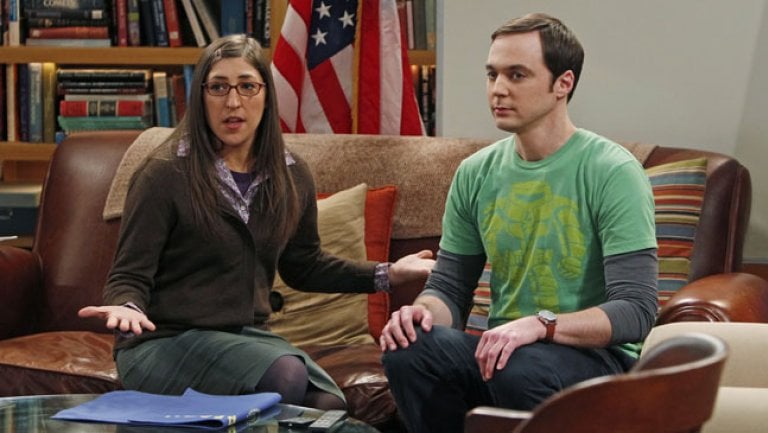The Big Bang Theory has received plenty of negative attention as it continues to air. However, now that CBS has ordered a spin-off series focusing on the life of young Sheldon Cooper, it’s really time to talk about one of the show’s biggest flaws: its complete ignorance of asexuality as an identity and how to approach it.
As an asexual person myself, I believe that Sheldon Cooper checks all the major boxes of asexuality, though the writers of the show insist he is not. In season 6, episode 1, Sheldon says, “I find the very idea of coitus ridiculous and off-putting.” Later, in episode 23, he says to Amy, “…before I met you, I never had any interest in being intimate with anyone.” From these two quotes alone it’s fairly clear that Sheldon is incredibly neutral towards sex, even disinterested or potentially repulsed.
Sheldon’s friends are constantly saying and doing things that undermine his feelings about sex. In season 6, episode 2, Leonard asks Sheldon if he is “finally becoming a red-blooded man with sexual desires,” implying that asexuality is a) an abnormality or a defect, b) something that can be “cured” and that goes away with time and c) something that detracts from a man’s masculinity.
Amy, Sheldon’s girlfriend, is also forever hinting at Sheldon that she desires more from him sensually and sexually. After his “before I met you” confession, she asks him “And now?” as if expecting that by meeting her, his asexual identity has magically changed. This reinforces the fallacy that asexuality can be “cured” by a specific person. (For the record, his response was “And now what?” because meeting Amy has not changed him.)
Furthermore, the cast is constantly badgering Sheldon about whether he will ever “be intimate with Amy.” Clearly the writers of the show see sex as the only source of intimacy in a relationship. In one episode, he meekly explains to Amy that “to [him] what [they] have is extremely intimate,” which was actually a nice moment but certainly doesn’t make up for the mess the writers have made.
Asexuality is an identity that is almost always dealt with poorly in the media. Characters who present as asexual are generally written as robotic and unable to comprehend normal human emotions (See also: Castiel from Supernatural and The Doctor from Doctor Who). This reinforces the harmful idea that sex is inextricably linked with love and romantic relationships, and to separate them would be abnormal and dysfunctional. Furthermore it perpetuates the misconception that asexuality and aromaticism are the same thing; that people who are disinterested in sex are inherently unable to take part in functioning romantic relationships or appreciate attractive people. Instead of Sheldon acknowledging this about himself, it’s used as a punchline, just another of Sheldon’s weird quirks, and treated as a symptom of a bigger personality disorder.
Fans of the show will argue that . But a person’s decision to have sex has no impact on their asexual identity. Plenty of asexual people decide to engage in sex for many different reasons. An asexual person’s body still functions in the same way and is capable of engaging in—and enjoying —sex if they so choose. A distant cry of “but he enjoyed kissing Amy!” can also be heard, but sexual and sensual attraction are two very different things. Different people can experience sexual and sensual desire separately and at different levels.
So what does good asexual representation look like? An ace character’s asexuality should not be the entire focus of their story. An asexual character can be in a good, strong romantic relationship—with or without sex—or not. A lovely example (potentially the only good example in mainstream media) of a good, multidimensional aro/ace character is Todd from BoJack Horseman. His identity is only revealed in season 3, before which point he is a prominent character in the show for other reasons.
Of course, Sheldon’s behaviour is open to interpretation, and the writers of The Big Bang Theory probably aren’t harbouring any malicious intent towards the asexual community. However, the creators of the show could definitely benefit from having a good hard think about what harm could possibly come from using this platform to positively educate people about an identity which is already manifest in one of their characters. It would be more true to Sheldon’s character to give him a real, honest identity and to respect that than to continue to write him into awkward, forced, even reluctant intimacy with Amy.
Such a big part of the reason people are so fascinated by Sheldon’s character is his attitude towards sex. You have to wonder – if this part of his identity were demystified, would he be a character worth watching? If yes, then an asexual Sheldon would not hurt the show, and would benefit the community. If no, then a character founded on nothing but misrepresenting a community certainly does not need his own show.
The community of asexuals, on paper, is only about 1% of the world population, but we’re moving into a time when recognising and representing identities fairly is vital. Sadly, this new spin-off show feels like a giant step away from a commitment from society to acknowledge asexuality as a valid identity.
Chloé Osmond is a 19-year old asexual South African womxn, and aspiring online media producer, currently using just sheer determination to make it through a journalism degree. On a related note, she is an expert at functioning on minimal sleep, powered only by memes and cookies. Find her on Twitter (@ChloeJeanOsmond) or YouTube (youtube.com/c/ChloeTheJean).
—The Mary Sue has a strict comment policy that forbids, but is not limited to, personal insults toward anyone, hate speech, and trolling.—
Follow The Mary Sue on Twitter, Facebook, Tumblr, Pinterest, & Google+.









Published: Mar 20, 2017 02:00 pm